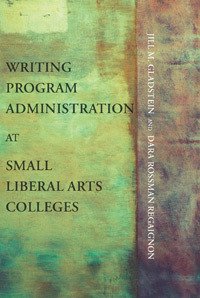English Literature Professor Jill Gladstein Explores College Writing Programs in New Book

Associate Professor of English Literature Jill Gladstein's new book, Writing Program Administration at Small Liberal Arts Colleges (Parlor Press, 2012), is one of the first efforts to explore a large sample of liberal arts institutions' writing programs in a single, comprehensive work. Co-authored with Dara Regaignon from Pomona College, the book includes research on 100 different colleges in the Annapolis Group, a consortium of leading liberal arts schools.
In the book, Gladstein does not offer readers a hierarchy of best-to-worst or most-to-least effective programs, but instead explores the different approaches colleges use to reaffirm their commitment to writing. To research such a large sample, Gladstein sent 97-question surveys to member institutions of the Annapolis Group. The impressive 80 percent initial response rate indicated a strong interest in her research.
"The whole premise of the book was to not just educate the field of writing studies about what was happening with liberal arts education, but to educate ourselves about what was happening at these schools," says Gladstein, who directs Swarthmore's Writing Associates Program. "Everyone seemed really interested to know what was happening because, on most campuses where there may only be one person who's the writing director, we began to uncover similarities and differences between our institutions."
Gladstein and Regaignon evaluate programs based on their commitment to student-centered writing and curriculum-centered writing. Student-centered programs typically include writing centers, where additional instruction and support can be sought for students who wish to continue to develop their skills, whereas curriculum-centered programs work to incorporate an emphasis on writing into students' programs of study, typically through course requirements. Additionally, the authors discuss verticality, or a commitment to writing throughout the college experience as opposed to merely during first-year seminars and final thesis projects. Finally, they looked at whether emphasized writing development exists implicitly within a curriculum or explicitly. Their research indicates a strong commitment to cross-curricular writing as well as a renewed emphasis on verticality at many of the colleges surveyed. Furthermore, they found that a majority of the institutions' histories contained a heavy emphasis on writing as an integral feature of a liberal arts education.
The impact of Gladstein's work is not lost on her colleagues. "I was at a conference, and you got this feeling from other members of the consortium, we're now represented," Gladstein said. "It was this pride in being represented and having a book that speaks to our context. We knew we were writing for the small colleges of the consortium but we didn't realize how much pride they'd have in being represented." Gladstein notes that colleagues are using the data collected in the book to make arguments for changes at their schools, supported by the contextualization the study has to offer.
The project allowed Gladstein, as well as her colleagues, to think about the writing programs at their institutions with a new perspective.
"It did make me think about how things are structured here at Swarthmore and what could be improved. Part of it is a discussion we need to have about how we define writing," Gladstein says. "Some schools start with a writing requirement because they want all their students to show competency. Swarthmore doesn't do that and I don't think that makes sense here. Some schools develop a writing center and say, 'We need to have a writing center because some students come in less prepared than others and we need to help them,' and treat it more like a deficit. I think at Swarthmore, although some people believe we need the writing program to help certain students, there's a really strong value on developing all students as writers."


